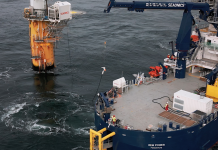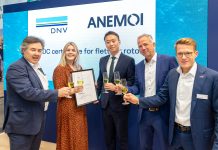Vestas will test Sustainable Aviation Fuel (SAF) at the Baltic Eagle Wind Farm in the Baltic Sea during 2024. The pilot project entails Vestas technicians and jack-up vessel crew using helicopters partly powered by SAF to transport themselves to and from the Baltic Eagle wind farm during the construction phase of 50 offshore wind turbines.

SAF is a fuel produced from bio-waste materials such as used cooking oil or tallow. Because SAF can help reduce lifecycle greenhouse gas emissions associated with air travel, it is generally considered a more sustainable alternative to conventional jet fuel. “This is yet another initiative through which Vestas continues to implement its sustainability strategy,” said Kieran Walsh, senior vice president and head of construction at Vestas Northern & Central Europe. “There is a significant need for more sustainable solutions during these wind farms’ construction and operation phases. The potential for using SAF in offshore operations is high and we are pleased to further exploit this potential.”
The pilot project is scheduled to take place until September 2024. Helicopter service provider HeliService will use helicopters from Leonardo S.p.a. flying on about 40 percent SAF provided by DCC & Shell Aviation Denmark A/S. A blend rate of 40 percent SAF is close to the highest possible blend rate permitted today, and it is the first time that SAF-fueled helicopters with such a high blend rate are used for an entire part during the construction phase of an offshore wind-farm operation. CO2 savings of about 32 percent per flight are expected compared to using a standard helicopter powered by conventional jet fuel. Vestas will assess the impact of the SAF following the end of the pilot project.
The initiative is in line with Vestas’ sustainability strategy, which includes becoming carbon neutral in Vestas’ own operations by 2030 and reducing emissions in their supply chain by 45 percent per MWh generated. “The delivery of SAF to Roskilde Airport, which will serve as a helicopter base during Vestas’ pilot project, marks another milestone in our efforts to support the growing demand for alternatives to conventional jet fuel,” said Sune Petersen, head of strategy and sustainability at DCC and Shell Aviation Denmark.
“It also marks an initial step towards introducing SAF into the fuel mix for helicopter services — not only in Denmark but also on a European scale.”
More info www.vestas.com



























